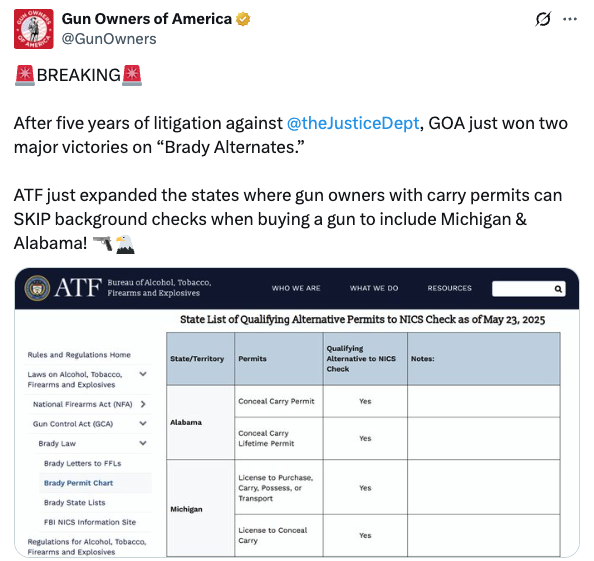On May 23, 2025, the Bureau of Alcohol, Tobacco, Firearms and Explosives (ATF) published an open letter to all gun manufacturers, importers, and dealers — Federal Firearms Licensees (FFLs) — stating that it would accept more state permits as alternatives for background checks on gun sales, including permits that the ATF had previously disqualified after learning that some law enforcement officials were not performing background checks on individuals before issuing them permits.
In other words, the ATF is making it easier for people prohibited from owning firearms, including criminals and domestic abusers, to skip background checks before buying guns.
The open letter was published days after the ATF announced its “New Era of Reform” under President Trump “marked by transparency, accountability, and partnership with the firearms industry. This is not the same ATF of the last four years.” The agency stated that it is “fundamentally changing course with a renewed focus on rebuilding trust with [FFLs], gun owners, and the public by prioritizing public safety and collaboration.”
The announcement included a list of steps that the ATF has already taken, including repealing the “zero tolerance” policy tasking the agency with revoking the licenses of gun dealers who willfully violated federal law, announcing that dealers who had their licenses revoked may reapply, and publishing a new administrative action policy directing ATF personnel to be much more lenient on dealers going forward — despite the fact that ATF inspectors uncovered violations in nearly one in five FFL inspections in fiscal year 2024.
None of these steps appear to “prioritiz[e] public safety.”
Brady alternatives
Under the Brady Handgun Violence Prevention Act of 1993, FFLs must conduct National Instant Criminal Background Check System (NICS) background checks on any non-FFLs before they transfer a firearm. However, the Brady Act contains an exception: The FFL does not have to run a background check on a customer who holds a qualifying state permit, such as a concealed-carry license, that required its own background check to obtain and is not more than five years old. Such state permits are known as “Brady alternatives.”
The ATF periodically assesses each state’s procedures, with help from FBI NICS audits, to see if their permits qualify as Brady alternatives — and it has disqualified some in the past.
For example, in July 2019, the ATF sent a notice to all FFLs in Alabama informing them that the state’s concealed-carry permits would not be accepted as Brady alternatives after the ATF and FBI discovered that county sheriffs had issued permits to “individuals without completion of a NICS check, or after a NICS denial. At least some of these permits were issued to felons and other federally prohibited persons who used them to purchase firearms from Alabama FFLs without a NICS check,” thus “creating a substantial public safety concern.”
NICS audit records from April 2019 obtained through a Freedom of Information Act request show that 12 counties in Alabama issued 41,250 permits to residents without conducting background checks. One of those counties issued 17,817 permits without performing a single background check, and some sheriff’s offices were “unaware of any of the federal denial criteria to deny a permit.”
As another example, in March 2020, the ATF notified FFLs in Michigan that the state’s Concealed Pistol License (CPL) was no longer valid as a Brady alternative after the “ATF learned that CPLs were and continue to be issued to applicants who were likely prohibited due to a conviction for a misdemeanor crime of domestic violence…and to habitual marijuana users.” Marijuana is still considered a “controlled substance” on the federal level, and as the ATF noted, “those using marijuana are prohibited from possessing or transporting a firearm.”
The NICS audit records further allege that Michigan State Police were not “denying applicants that may have an active warrant” or conducting research to determine if they had misdemeanor crimes of domestic violence on their record.
undoing the background check system
These examples highlight the problems with certain state permitting procedures. Yet the ATF’s open letter and updated “Brady Permit Chart” show that Alabama and Michigan’s concealed-carry permits are now acceptable Brady alternatives, without any explanation. The ATF has not said whether state authorities corrected their previous deficiencies, for example.
Gun Owners of America (GOA), a far-right gun group that had previously challenged the ATF’s rulings on Alabama and Michigan permits in court, celebrated the “major victories” on X, as shown below. The group opposes all gun safety measures, even background checks on gun sales, and counts several gun manufacturers as “partners.”

Previously, the ATF also did not allow any Brady alternatives for Indiana, Missouri, Wisconsin, or Puerto Rico, but now their concealed-carry permits are considered acceptable according to the updated Brady Permit Chart. Once again, the agency has not provided any information as to its change in position — despite naming “transparency” and “accountability” as defining features of the “New Era of Reform.”
Now it is unclear if the ATF will continue assessing state permitting procedures or disqualify permits after learning that state authorities are not properly conducting background checks. These changes, like the decision to rescind the “zero tolerance” policy, appear to contradict the ATF’s missions of solving gun crimes and preventing guns from falling into the wrong hands.